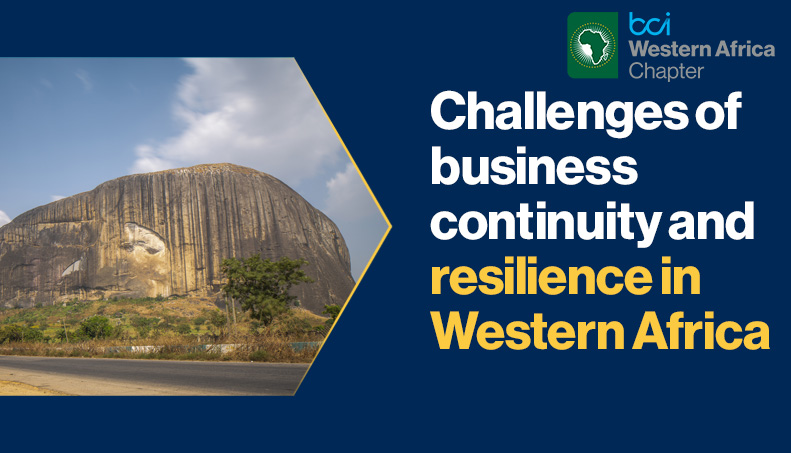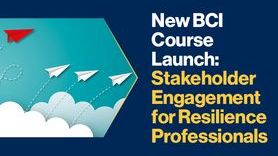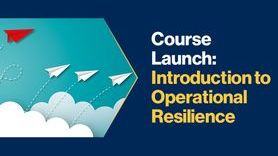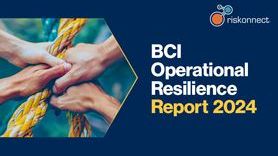Challenges of business continuity and resilience in Western Africa

Building resilient organizations in Western Africa is both a challenge and an opportunity. The field of resilience has changed significantly in Western Africa over the past two decades, in part due to increasing climate related events, cybercrime, and world economic forces. Faced with this increasingly volatile future, resilience professionals are working hard towards continued sector growth that heightens the profile of business continuity and strengthens the region’s overall resilience.
Key opportunities to build resilience
The sectors leading resilience and contributing more to the development of business continuity within the West African region are industries with high safety requirements, such as oil and gas, aviation, and health sectors, and industries with high regulatory requirements including telecoms, financial services, and the fast-moving consumer goods sectors.
Chapter leadership believes that two of the biggest challenges to these industries are climate-related natural disasters and increasing cybercrime. In order to address these pressing challenges, regulatory bodies have placed more demands on resilience such as the
Nigeria Data Processing Regulation (NDPR).
Chapter leader Tunde Dada said:
“I have seen a gradual but slow involvement of government institutions in the growth of the business continuity and resilience industry, but much more positively within the private sector. In this sector there has been more visible progress, and this is set to grow in the coming years especially with the onslaught of cybercrime across the region which has prompted regulatory bodies to place more demand on resilience for all players in the financial sector and beyond. This has put a greater spotlight on the BC and resilience industry and opened up more opportunities.”
Key resilience challenges faced by practitioners
The main challenge that practitioners experience when trying to implement business continuity and resilience strategies within organizations is the lack of executive representation in the boardroom to push the cause to the required extent. Chapter leaders believe the lack of executive representation for business continuity not only stifles the creation of effective resilience plans, but also prevents career progression as the lack of executive interest may be off-putting to professionals seeking a career in the industry.
Another issue often faced by practitioners is the low number of auditing firms that can complement business continuity work, especially the ISO 22310 programme. The West African region currently does not have enough firms to provide auditing when needed and, over the years, this has been a concern for many professionals.
Practitioners would like to see more visibility of business continuity and resilience professionals in the board room, and in government circles, to push BC ideals and imbibe a culture of resilience in organizations. Chapter leadership are hopeful that this situation is beginning to change because organizations are increasingly keen to employ resilience professionals and support their career paths in response to Western Africa’s current and future challenges, not least of which are the government’s increasing regulatory requirements.
Vice leader Yahya Jammeh said:
“The lack of executive representation and the shortage of auditing firms are critical challenges that hinder the advancement of business continuity and resilience practices. Addressing these issues is essential for creating effective resilience plans, fostering career growth in the sector, and ensuring that organizations can meet the standards required to withstand disruptions.”
How the Chapter will tackle the challenges
The Chapter hopes to strengthen regional resilience in various ways including promoting awareness across the region within the public and private sectors to ensure resilience is pushed to forefront of decision making. Its strategies include:
- Engaging with relevant industry leaders across the region
- Lobbying industries through constructive engagement with business leaders
- Highlighting the key role of the business continuity and resilience professionals in their various industries.
The Chapter also wants to attract much needed young professionals to the sector, which is currently lacking qualified and experienced business continuity professionals, and poses a real challenge to the resilience of the West African region.
Focusing on these areas will significantly strengthen future resilience in Western Africa, helping organizations better handle threats and disruptions while ensuring continuity and stability.
Tunde said:
“We intend to tackle this shortfall of practitioners by our forage into the academic sector to form junior business continuity Clubs that ensure interest in the profession at a young age. We also want to encourage business continuity and resilience professionals who might still be outside the fold of the BCI to see their involvement as a positive addition to their career arsenal that will ultimately give them the professional visibility that they require”.
Yahya added:
“Due to the current shortage of young professionals in the business continuity and resilience sector in our region, the Chapter must focus on early education, capacity building, and youth engagement. This approach will not only attract new talent but also ensure the sustainability of the sector. By nurturing the next generation through education and training, empowering professionals with essential skills, and fostering strong networks, it paves the way for a secure and sustainable future.”
The BCI Western Africa Chapter launched in June 2024 with the aim of enhancing knowledge and capabilities of professionals and supporting the business continuity and resilience community in the region. You can join this proactive Chapter here.










































